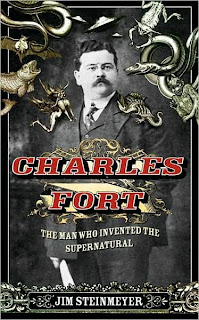 Charles Fort was a one-trick pony, but it was a damn good trick. His four famous books -- The Book of the Damned, New Lands, Lo!, and Wild Talents -- all collected odd, unusual facts, which Fort arranged in various patterns to poke fun at scientific certainties or to bolster various odd theories.
Charles Fort was a one-trick pony, but it was a damn good trick. His four famous books -- The Book of the Damned, New Lands, Lo!, and Wild Talents -- all collected odd, unusual facts, which Fort arranged in various patterns to poke fun at scientific certainties or to bolster various odd theories.Steinmeyer, most of the way through this exceptionally engaging biography, makes the point that no leader can choose his followers, and that goes double for Fort. Steinmeyer was referring to Tiffany Thayer -- the puppyish founder of the Fortean Society: always underfoot, overeager, and with a marked tendency for drooling approval -- but it applies equally well to hundreds or thousands of "Forteans" over the past few decades. They might not all be humorless, they might not all be anti-science, but they rarely seem to really understand how equivocal, humorous, and conflicted Charles Fort really was.
To be blunt, most people know Fort as a crank, if at all. But Fort wasn't a crank, or not purely a crank -- his theories were always half-joking. And the main purpose of his work was to unearth spiky facts -- the kind that don't fit the accepted theories -- and see what he could do with them. (Though Steinmeyer also describes what's known about Fort's two lost books, written before The Book of the Damned -- X and Y -- and those sound like more traditional crank books, with potted explanations for everything.)
Steinmeyer draws heavily on the previous major biography of Fort, Damon Knight's Charles Fort, Prophet of the Unexplained, but he's also done some serious original research, particularly in digging into Fort's relationship with Theodore Dreiser. He's a careful and thorough writer, restrained in attributing emotions or actions to Fort that he can't back up; I didn't find a single "he must have," the hallmark of the lazy or sourceless biographical writer.
In fact, there are places where I actively wanted Steinmeyer's speculations. For example, Fort married Anna Filing in 1896, when she was twenty-six. When he died in 1932, he left Anna as a widow...and no children. Steinmeyer resolutely refuses to speculate about their private life, but pure childlessness, in that era, is an anomaly to be at least noted.
If I were a professional book reviewer -- which I am not -- I would have given you a potted life story of Fort, essentially this book in miniature, and avoided talking about Charles Fort as a book entirely. (This is because even professional book reviewers can feel guilt when they come to criticize something they've just been cribbing from.) Instead, I'll just say that if you're interested in Fort's life, Charles Fort: The Man Who Invented the Supernatural is written with life and energy, and is just as long as it needs to be. Go read that book instead of some critic's regurgitation of it; it might take a little longer, but it will be more pleasant and enlightening.
And if you don't know who Fort is, click on this link below marked The Book of the Damned for the new omnibus edition of his four great books and see for yourself. In some ways, Fort is one of the greatest science fiction writers of all time -- all the more so because what he was writing wasn't fiction.
1 comment:
What do you think of the Fortean Times?
Some of the writers can be a bit plonking but it would never have occurred to me to think of something that published cartoons by Hunt Emerson as being humourless.
Post a Comment